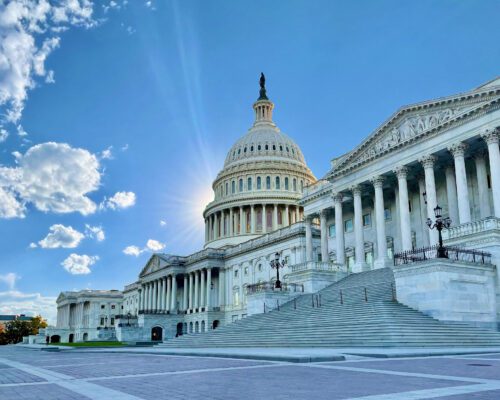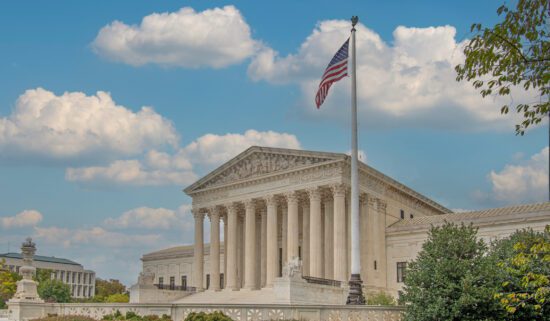Last week, the Equality Act was once again introduced into the House of Representatives and the Senate for consideration. This legislation intends to expand the definition of “sex” to include “sexual orientation” and “gender identity” (SOGI) and would revise every title of the Civil Rights Act of 1964 to add these categories as new protected classes in the federal code. Last Congress, the Equality Act passed in the House, but the bill died in the Senate.
The ERLC affirms the full dignity of every human being. At the 2018 Annual Meeting of the Southern Baptist Convention, the Messengers passed a resolution to “reaffirm the sacredness and full dignity and worthiness of respect and Christian love for every single human being, without any reservation.” But the Equality Act does not advance the cause of human dignity.
If passed, the Equality Act would punish faith-based charities for their core religious beliefs about human dignity and marriage and would undermine decades of civil rights protections for women and girls. The alarmingly detrimental consequences of the bill pose a significant threat to the deeply held religious beliefs of millions of Americans who honor God’s design for sexuality.
What does this bill mean for religious liberty?
This bill would substantially undermine religious liberty protections in the United States. America has long been a place where people with different views and beliefs have lived at peace alongside each other. Though America has not perfectly lived up to this ideal of a shared nation, it was central to our founding as persecuted religious minorities sought safe harbor in this land. Though cleverly named, the Equality Act is out of step with that American ideal. Equality cannot be achieved while eliminating other basic, fundamental freedoms. Of particular note, the bill would essentially gut the 1993 Religious Freedom Restoration Act (RFRA), a bill which passed with broad bipartisan support and was signed by President Clinton.
By undermining RFRA, the Equality Act would force faith-based child welfare organizations to abandon their deeply held religious beliefs or be shut down by the state. The state-forced closures of such agencies is especially detrimental at a time when multiple crises—including the post-pandemic effects and the ongoing opioid epidemic—have led to increases in the number of children in need of services.
What does the bill mean for women and girls?
Most strikingly, the Equality Act undermines decades of hard fought civil rights protections for women and girls. Single gender spaces, such as locker rooms or shelters, would no longer be protected by law. This departure from a legal understanding of gender as male and female makes women and girls vulnerable to biological males being in their private spaces. For example, shelters for those women and girls escaping domestic abuse or homelessness would be forced to house biological men who identify as female. This legislation disregards the privacy and safety concerns women rightly have about sharing sleeping quarters and intimate facilities with the biological opposite sex.
Another example of the harm this legislation poses to women and girls is in athletics and academics. Since 1972, Title IX has advanced women’s sports and scholarship in remarkable ways. If enacted, the Equality Act would threaten female competition as both areas would then be open to biological males as well.
Are there pro-life concerns in the Equality Act?
Yes. The Equality Act would be the most pro-abortion bill ever passed by Congress. It would redefine the term “sex” to also include “pregnancy, childbirth, or a related medical condition.” This language would roll back federal law that protects the consciences of pro-life nurses and physicians who object to participating in abortions because of their deeply held religious or moral beliefs. These conscience protections carry decades of bipartisan consensus—a consensus that no person should be compelled to participate in an act they believe to be gravely immoral. The Equality Act would also jeopardize the longstanding Hyde Amendment that protects federal taxpayer dollars from funding abortion. There is nothing equalizing about forcing Americans to fund abortion through taxpayer dollars.
How has the ERLC been involved?
The ERLC has worked tirelessly to defeat this bill. We have partnered with a broad coalition of more than 85 faith-based nonprofits, religious entities, and institutions of higher education to highlight the dangers of the Equality Act. We have raised these concerns with members of Congress and the administration through coalition letters and countless meetings with members, administration officials, and their staff. We have also engaged in public advocacy against the bill by producing a suite of resources to inform Christians and the broader public about the pernicious threat of the so-called “Equality” Act.
What’s next?
In the prior Democrat-led House, the Equality Act passed 224-206, with three Republicans joining all 221 Democrats. In the 118th Congress, Republicans narrowly hold the majority seats, but the bill is unlikely to make it to the floor for a vote. Two of the three Republicans who voted in favor of the bill are no longer in Congress, which makes it even more difficult for Democrats to force a vote on the bill. Another obstacle is Speaker McCarthy’s commitment to unifying the Republican majority’s voice in the House to present a strong front before the American people.
While it is unlikely the bill will be passed in this Congress, its continued appearance presents a larger, on-going threat to human dignity and religious liberty. The ERLC will continue to highlight how the Equality Act erodes fundamental freedoms and undermines the ability of Americans of diverse beliefs to work together for the common good.









